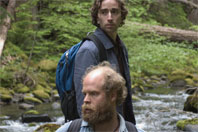![[Deep Focus]](../../flicker/longo.gif)
|
|
| Old Joy | |
 |
B+ |
|
Back to nature. |
|
![[Deep Focus]](../../flicker/longo.gif)
|
|
| Old Joy | |
 |
B+ |
|
Back to nature. |
|
|
Movie Credits: Directed by Kelly Reichardt Written by Jonathan Raymond and Reichardt Cinematography by Peter Sillen Starring Daniel London and Will Oldham USA, 2006 Aspect ratio: 1.85:1 Screened 3/10/06 at MoMA Titus 1, New York, NY Reviewed 3/22/06
|
Old Joy is set in the Pacific Northwest, one of the American cinema’s less photographed regions, and its characters move out of the city and into the forests and then back again. Compared to films that are more self-conscious about their depiction of natural beauty, Old Joy has a modest aesthetic. This is how the world looks from ground level, seen through a car window. This is how it looks from the streets of Portland. And this is how it sounds: the keening guitars of Yo La Tengo over a richly detailed mix of noises found mainly in nature. At one point I scribbled in my notes, “This is the cinema of sitting around and talking,” which is a glib way of thinking about a movie that does, in fact, feature lots of both. But what makes it fascinating is director Kelly Reichardt’s single-minded focus on a certain type of relationship. Mark (Daniel London) takes off on a spur-of-the-moment camping trip with old buddy Kurt (musician Will Oldham) after getting his pregnant wife to grant half-hearted permission. The dynamic between the two guys is simultaneously fluid and uncomfortable. Mark has matured, with a family and a decent vehicle and what’s known as a life. Kurt has languished, acquiring none of that. It’s unclear what he does for a living, and his crypto-poetic view of the world is aging poorly. Mark drives around town listening to talk-radio pundits place the workings of the world in the context of religious zealotry and political parties; Kurt explains that he sees all the universe existing in the shape of a teardrop falling through space. (The church looming in the background as the two hit a convenience store on their way out of town may signal a spiritual undercurrent to their disconnection.) It takes a while for Mark and Kurt to reach their destination, a hot-spring retreat that Kurt remembers fondly from an earlier getaway, promising that it offers a comfortable respite from the noise and clutter of civilization. (“You can’t get real quiet anymore,” he laments.) That sounds good to Mark, a fellow for whom you get the idea a world outside the rigors of civilization has mostly ceased to exist. But minutes stretch into hours, and as the sun sets on day one Kurt is still lost. Mark reveals his impatience in a phone call to his wife outside a diner the next morning. “Remember who we’re dealing with,” he growls into the phone. (Minutes later, he’ll assure Kurt, “I never doubted you.”) So there’s a fundamental duplicity in the relationship, with Mark paying lip service to shared experience, but entertaining a certain pity and condescension that he won’t cop to. And so it goes. Mark and Kurt seem to connect on the most basic level when they finally reach their destination, popping a couple of beers and settling naked into what look to be bathtub-shaped tree trunks filled with steaming hot spring water. (“Bagby Hot Springs does not allow nudity or alcohol,” warns a title card at the very end of the film.) Mark almost suffers an attack of gay panic when Naked Kurt settles in behind him to offer a back rub, but it passes. And then the two are back on the road, Mark dropping Kurt back into the loneliness he’s found for himself at the edge of town. The last event depicted in the film is Kurt’s backtracking to hand money to a beggar he passed by moments before. If it’s a life characterized by the sorrow alluded to in the film’s title, it’s a life deeply felt — and one that Mark can barely imagine exists. |
 http://www.deep-focus.com/index.html
bryant@deep-focus.com
http://www.deep-focus.com/index.html
bryant@deep-focus.com